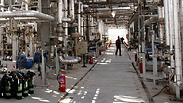
Arak heavy-water reactor
Photo: Reuters
VIENNA - The United States said on Monday that talks between Iran and six world powers on a long-term deal for Tehran to limit its nuclear program and see international sanctions lifted will be long and complicated with no guarantee of success.
The remarks came from a senior US official, who spoke on condition of anonymity on the eve of the first round of high-level negotiations since an interim deal struck on November 24 under which Tehran curbed some nuclear activities for limited sanctions relief.
"These next days this week are the beginning of what will be a complicated, difficult and lengthy process," the administration official told reporters in the Austrian capital.
Related stories:
- Khamenei: Nuclear talks will lead nowhere
- Iran seeks new Russia nuclear reactor in exchange for oil
- 'Iran got something for nothing,' prime minister says
Senior officials from Britain, China, France, Germany, Russia and the United States will begin several days of talks in Vienna on Tuesday with an Iranian delegation led by Foreign Minister Mohammad Javad Zarif and his deputy Abbas Araqchi.
European Union foreign policy chief Catherine Ashton will oversee the talks, which will be the first in what is expected to be a series of meetings in the coming months.
While cautioning the talks would take time, the official said Washington does not want them to run beyond a six-month deadline agreed in the November 24 deal. The late July deadline can be extended for another half year by mutual consent.
"Our intent is to use these six months to negotiate a comprehensive agreement," the official said.
"I think we will certainly know in six months, in probably much sooner than that, whether the odds have increased or not to get a comprehensive agreement," the official said.
"But our goal, our objective, is to use these six months ... to get a comprehensive agreement."
Willing to compromise?
During a decade of on-and-off negotiations with Western powers, Iran has rejected their allegations that it is seeking a nuclear weapons capability, saying it needs atomic power plants for energy generation and medical purposes.It has defied UN Security Council demands that it suspend uranium enrichment and other sensitive activities, leading to a crippling web of US, EU and UN sanctions that has severely damaged the oil-producing nation's economy.
Since the June 2013 election of relative moderate Hassan Rouhani as president, Tehran has repeatedly reached out to Washington in a bid to ease more than three decades of mutual enmity and end Iran's international isolation.
The US official said there was no guarantee the Vienna negotiations would yield an agreement.
"As President (Barack) Obama has said, and I quite agree, it's probably as likely that we won't get an agreement as it is that we will," the official said.
But the official also signalled potential US willingness to compromise on one of the most divisive issues in the three rounds of negotiations in Geneva that led up the November 24 agreement with Iran - the heavy-water reactor at Arak that could one day produce arms-grade plutonium.
The official was responding to remarks from Iran's atomic energy chief, Ali Akbar Salehi, who was quoted earlier this month as saying that Tehran might be willing to allay Western fears about Arak by modifying it.
"We were pleased to see the head of the (Iranian) atomic energy agency, Dr Salehi, say that they were open to discussions of whether there were modifications that would be viable," the official said.
"I think we have a long way go in these discussions but I think that we all have to be open to ideas and ways to address our concerns," the official said.
Iran's Supreme Leader Ayatollah Ali Khamenei, however, said on Monday that he was not optimistic that the nuclear talks between Iran and the six powers would produce a viable agreement, predicting that the process "will not lead anywhere."















